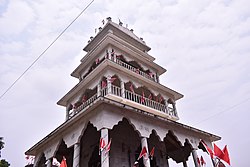 The Thakurbari Temple of the Matua Mahasangha The Thakurbari Temple of the Matua Mahasangha | |
| Total population | |
|---|---|
| c. 50 millions | |
| Founder | |
| Harichand Thakur | |
| Religions | |
| Hinduism | |
| Languages | |
| Sacred Bengali and Sanskrit Holy Book Harililamrito Majority Bengali | |
| Related ethnic groups | |
| Namasudras |
The Matua Mahasangha (Bengali: মতুয়া মহাসংঘ) is a Hindu reform movement that originated around 1860 AD in modern-day Bangladesh. Today, it has a considerable number of adherents both in Bangladesh and in West Bengal, India.
The Matua movement originated among the Namasudras, an avarna (outcaste) community of Bengali Hindus, founded by the followers of Harichand Thakur. The teachings of Harichand, also known as Matuaism, emphasise the importance of education for the upliftment of the population, while also providing a formula for ending social conflict.
Members of the Matua Mahasangha believe in Swayam-Dikshiti ("Self-Realisation") through harinaam, the chanting of the holy name of Hari (God). Harichand stressed the congressional chanting of God's name as the sole means to mukti (liberation). In Bengali, this is known as hariname matoara, giving rise to the name "Matua".
History
Harichand Thakur was born to a peasant family belonging to the Namasudra community. According to historian Sekhar Bandyopadhyay, Thakur "experienced atma darshan or self revelation, through which he realized that he was the incarnation of God himself, born in this world to bring salvation to the downtrodden". Reforming Vaishnava devotionalism, he established the Matua sect of Hinduism. The sect was centered in Thakur's ancestral village, Orakandi, Faridpur, Bengal Presidency (now in Bangladesh). Their most sacred shrines are located there.
The Matua Mahasangha ("Matua Federation") was formed by adherents of Harichand's philosophy before 1915 to organize devotees. In the early 1930s, Pramatha Ranjan Thakur, great-grandson of Harichand Thakur, rejuvenated the organization. He started an ashram in the Labanchora neighborhood of Khulna, Bangladesh. After the partition of India in 1947, large numbers of Matua migrants settled in West Bengal, India, Pramatha Ranjan Thakur among them. He founded the town of Thakurnagar, which became the new headquarters of the Matua Mahasangha.
Notes and references
Notes
- "In Bengal, battle for Matua vote heats up". Hindustan Times. 23 March 2021. Retrieved 19 December 2022.
- Mukherjee, Sipra (3 April 2018). "In Opposition and Allegiance to Hinduism: Exploring the Bengali Matua Hagiography of Harichand Thakur". South Asia: Journal of South Asian Studies. 41 (2): 435–451. doi:10.1080/00856401.2018.1445400. ISSN 0085-6401.
- Bandyopadhyay 1995, p. 163
- Lorea 2020, p. 2
- Bandyopadhyay 1990, p. 2563
- Walker 1999, p. 566
- Bandyopadhyay 1995, pp. 183–184
- Mukherjee 2020, p. 71
- Lorea 2020, pp. 11–12
References
- Bandyopadhyay, Sekhar (17 November 1990). "Community Formation and Communal Conflict-Namasudra-Muslim Riot in Jessore-Khulna". Economic & Political Weekly. 25 (46): 2563–2568. JSTOR 4396995.
- Bandyopadhyay, Sekhar (1995). "The Matua Sect and the Namasudras". In Ray, Rajat Kanta (ed.). Mind Body and Society: Life and Mentality in Colonial Bengal. Oxford University Press. ISBN 019-563757-7.
- Lorea, Carola Erika (28 February 2020). "Religion, Caste, and Displacement: The Matua Community". In Ludden, David (ed.). Oxford Research Encyclopedias: Asian History. Oxford University Press. doi:10.1093/acrefore/9780190277727.013.428. ISBN 978-0-19-027772-7.
- Mandal, Mahitosh (2022). "Dalit Resistance during the Bengal Renaissance: Five Anti-Caste Thinkers from Colonial Bengal, India". Caste: A Global Journal on Social Exclusion. 3 (1): 11–30. doi:10.26812/caste.v3i1.367.
- Mukherjee, Aditi (2020). "Re-thinking protracted displacements: insights from a namasudra refugee camp-site in suburban Calcutta". Contemporary South Asia. 28 (1): 58–73. doi:10.1080/09584935.2019.1666089.
- Walker, Dennis (Winter 1999). "Matua Untouchable Writers In West Bengal: Between Islam And India's Changing Upper Caste-Led System". Islamic Studies. 38 (4): 563–602. JSTOR 20837062.
External links
- Matua at Banglapedia
| State of West Bengal | |||||||||||
|---|---|---|---|---|---|---|---|---|---|---|---|
| Capital: Kolkata | |||||||||||
| State symbols | |||||||||||
| History |
| ||||||||||
| Geography | |||||||||||
| Governance | |||||||||||
| Rights groups | |||||||||||
| Divisions and districts |
| ||||||||||
| Cities and towns |
| ||||||||||
| Culture |
| ||||||||||
| GI products |
| ||||||||||
| Demographics | |||||||||||
| People |
| ||||||||||
| Image gallery at Wikimedia Commons | |||||||||||
This Hinduism-related article is a stub. You can help Misplaced Pages by expanding it. |
